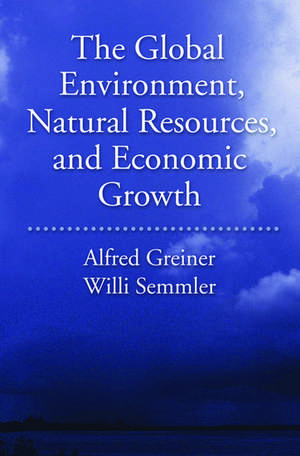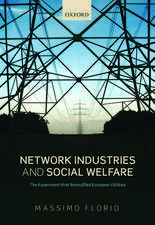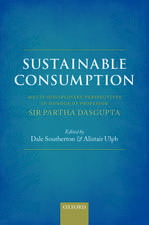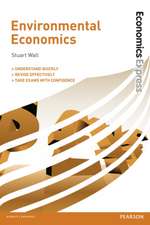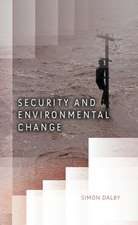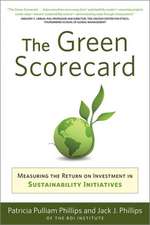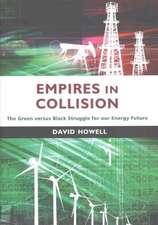The Global Environment, Natural Resources, and Economic Growth
Editat de Alfred Greiner, Willi Semmleren Limba Engleză Hardback – 14 aug 2008
Preț: 377.08 lei
Preț vechi: 519.31 lei
-27% Nou
Puncte Express: 566
Preț estimativ în valută:
72.15€ • 75.33$ • 59.72£
72.15€ • 75.33$ • 59.72£
Carte tipărită la comandă
Livrare economică 24-31 martie
Preluare comenzi: 021 569.72.76
Specificații
ISBN-13: 9780195328233
ISBN-10: 019532823X
Pagini: 220
Ilustrații: 26 line illustrations
Dimensiuni: 236 x 160 x 25 mm
Greutate: 0.51 kg
Editura: Oxford University Press
Colecția OUP USA
Locul publicării:New York, United States
ISBN-10: 019532823X
Pagini: 220
Ilustrații: 26 line illustrations
Dimensiuni: 236 x 160 x 25 mm
Greutate: 0.51 kg
Editura: Oxford University Press
Colecția OUP USA
Locul publicării:New York, United States
Recenzii
Issues concerning the global environment, natural resources and economic growth are at the heart of a great deal of current political and social debate. Greiner and Semmler in this book address these issues within the framework of modern economic theory, in particular applying the techniques of intertemporal optimal growth theory. They develop an integrated framework for the study of environmental and climate issues as well as those concerning renewable and non-renewable resources. As a result they present a range of simple models that give policy insights and policy recommendations. This book should be of interest to applied economists, climate change modellers and environmental policy makers.
Can economic growth continue in the face of environmental and resource constraints? Or rather, what kind of growth can continue in the face of such constraints? And what kinds of institutions are needed to bring about this growth? Clearly there are few questions that are of more significance for humanity. Greiner and Semmler bring tools of sophisticated economic theory to play in exploring the answers to these questions. Their analysis is thought-provoking and instructive, and is strongly recommended to anyone who wants to explore these issues deeply.
This book offers a substantial and significant achievement from these two representatives of the Bielefeld School. Using endogenous growth theory, they construct a sophisticated, general model of the interaction between growth and the environment, and then show specifically using empirical data how it can be used to analyze policy regarding global warming, and problems of renewable and nonrenewable resource management in a nonlinear dynamic context. It provides examples of how conventional policy nostrums may not always work. This book should be required reading for serious students of these matters.
Can economic growth continue in the face of environmental and resource constraints? Or rather, what kind of growth can continue in the face of such constraints? And what kinds of institutions are needed to bring about this growth? Clearly there are few questions that are of more significance for humanity. Greiner and Semmler bring tools of sophisticated economic theory to play in exploring the answers to these questions. Their analysis is thought-provoking and instructive, and is strongly recommended to anyone who wants to explore these issues deeply.
This book offers a substantial and significant achievement from these two representatives of the Bielefeld School. Using endogenous growth theory, they construct a sophisticated, general model of the interaction between growth and the environment, and then show specifically using empirical data how it can be used to analyze policy regarding global warming, and problems of renewable and nonrenewable resource management in a nonlinear dynamic context. It provides examples of how conventional policy nostrums may not always work. This book should be required reading for serious students of these matters.
Notă biografică
Alfred Greiner is professor of Economics at Bielefeld University. His research interests are in dynamic macroeconomics with special emphasis on topics in economic growth and fiscal policy. He has published numerous articles and was invited to author the survey article "Models of Economic Growth" for the UNESCO Encyclopedia of Life Support Systems. Willi Semmler is Chair and Professor of Economics at New School University, co-director of the Center for Empirical Macroeconomics, Bielefeld University and Research Fellow at the Bernard Schwartz Center for Economic Policy Analysis. He is the author of numerous articles and several books including Stochastic Dynamic Macroeconomics (OUP, 2006).
